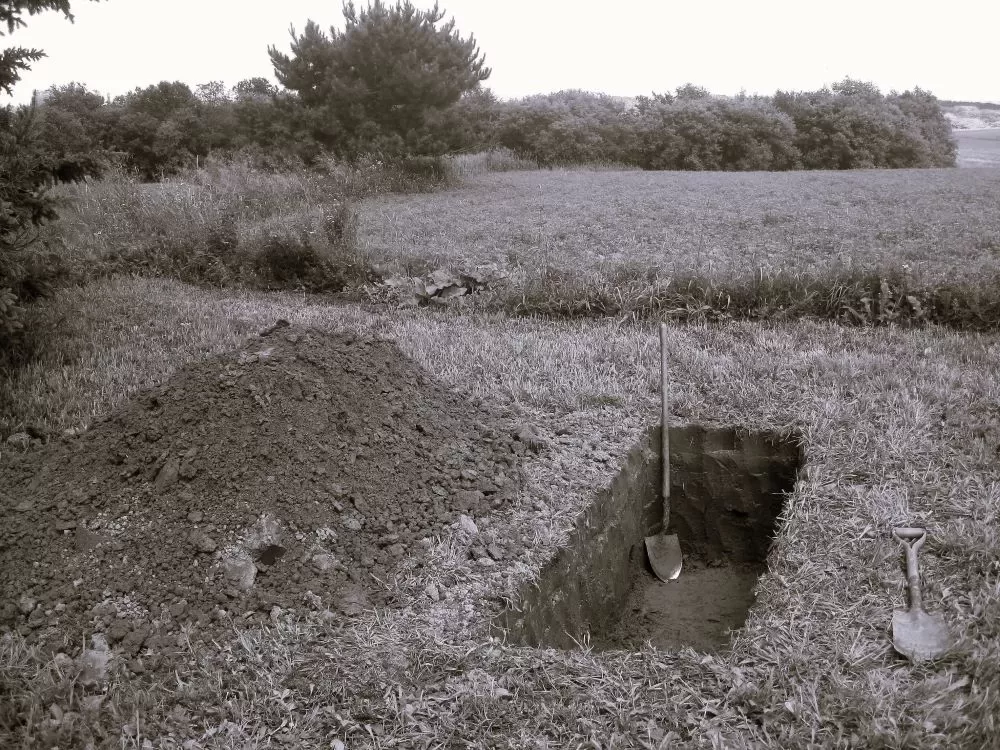William Shakespeare managed to pack an awful lot of drama into his graveyard scene in Hamlet. In fewer than three hundred lines his clowns discuss the topics of suicide, class privilege and the gravedigger’s craft, and engage in outrageous wordplay, while the central character articulates a profound meditation on mortality and its democratic nature. Hamlet’s birth is discussed, as is his madness, and there is still time and space for Ophelia’s funeral, some melodramatic posturing by Laertes and Hamlet and a grappling match in the freshly opened grave.
The scene came back to me when I found myself, a forty-something white-collar worker, cast for the very first time in the unlikely role of gravedigger in a churchyard in the East Clare village of Bridgetown. Growing up on a farm in North Tipperary I was well familiar with rural funeral rituals, including the digging and covering of graves by neighbours of the deceased, following the custom of meitheal traditionally used in harvesting operations. Neighbours and relatives volunteered for the work and were rewarded with generous measures of whiskey after (and sometimes during) the excavations.
The occasion of my grave digging debut was the death of an in-law of my brother’s wife, so the event was not tinged by any sense of personal grief or loss. No meitheal materialised in the churchyard and there were just three of us to do the needful, my brother, a neighbour of the deceased and myself.
Every grave digging undertaking requires a technical expert who knows the dimensions of a grave and is particularly active in the first phase of the operation when the sod is stripped and rolled up around a long stake, ready to be replaced intact after the burial. In this instance the neighbour adopted the technical role and I learned from him that a standard grave measures seven feet long by three feet wide with a depth of six feet for a newly opened grave and four feet for one previously occupied. Thankfully we were obliged to dig no deeper than four feet but it was still hard work, particularly in the lower reaches where there was space for only one shoveller and the tight confines made digging and delving difficult. But we got there and we encountered, as we knew we would, the bones of the previous occupant. These we deposited delicately on the edge of the precipice before squaring the grave and completing our digging. Then we adjourned for a drop of the craythur before replacing the bones and camouflaging them with a shallow coating of soft clay. And that was our job done.
Hamlet, hearing one of the gravediggers sing as he worked, asked “Has this fellow no feeling of his business that a sings at grave making?” It sounds like a reasonable complaint, but I have learned from my work in Bridgetown and in other graveyards in the Mid-West that there is no feeling in the making of graves. I learned this lesson while digging the graves of people close to me. They were sad funerals, as the saying goes, and on most of those occasions there were large numbers queuing to lay their hands on the picks and shovels. But what struck me when those graves were being dug was the prevailing mood of detachment and normality. It was as if the reality of death had been temporarily suspended so that the work could proceed in a spirit of relaxation and neighbourliness. Nobody sang, but the news and sports stories of the day were discussed, and jokes were exchanged. To the eye of a neutral observer we might have been thinning turnips or cutting peat. Looking back, the removal and replacement of those bones in the churchyard in Bridgetown seemed as natural a process as the planting or harvesting of potatoes.
My experiences in and around graves prepared me for the times when my own parents would shuffle off their mortal coil. Protocol precluded me from taking part in the digging of their graves, but I was present at both undertakings as a show of solidarity with the work party and to play my part in dishing out the refreshments. And that relaxed, neighbourly mood softened the sense of loss for my brothers and me.
Hamlet’s clowns were clearly professional gravediggers, similar to the municipal employees with their mechanical diggers who prepare the graves for today’s urban funerals. In such settings the closing of the grave is done after the crowd has dispersed, but I prefer the old rural tradition where the mourners, dressed up for the funeral, stand around the grave while local men, turned out in working clothes, do the scooping and levelling. Occasionally a mourner or two will step forward gingerly to cast in a few token shovelfuls of earth. After which they discreetly step aside to allow bona fide wielders of the shovel deliver what is literally the final act of closure.
![]()
Michael’s latest poetry collection, This Deluge of Words (2023), was published by Revival Press and is available here.
Learn more about Michael on our Contributors’ Page
Looking for more exciting new voices? Check out the Largest List of Independent Publishers to find your next read.
(Photo: Eli Duke/ flickr.com/ CC BY-ND 2.0)
- Three Poems by Michael Durack - February 22, 2024
- Alas, Poor Yorick by Michael Durack - October 12, 2023


